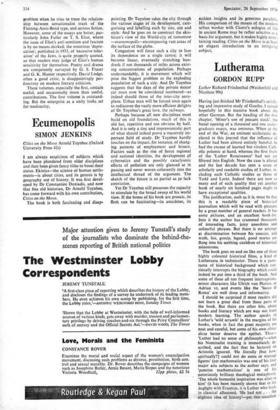Ecumenopolis
SIMON JENKINS
Cities on the Move Arnold Toynbee (Oxford University Press 42s) I am always suspicious of subjects which have been plundered from older disciplines and then been given fancy titles to boost their status. Ekistics—the science of human settle-4 ments—is about cities, and its genesis is by geography out of history. It was first develi oped by Dr Constantine Doxiadis, and now that fine old historian, Dr Arnold Toynbee, has come forward with his own contribution, Cities on the Move.
The book is both fascinating and disapl
pointing. Dr Toynbee takes the city through the various stages of its development, cate- gorising and labelling each by size, site and style.- And he goes on to construct the ekis- tician's view of the World-city of tomorrow —ecutnenopolis—encompassing vast areas of the surface of the globe.
Congestion will force such a city to lose its dependence on a single centre; it will become linear, eventually stretching hun- dreds if not thousands of miles across exist- ing concentrations of population. Perhaps understandably, it is movement which will pose the biggest problem to the exploding population of such a city. And Dr Toynbee suggests that the days of the private motor car must now be considered numbered—as indeed should those of the inter-city aero- plane. Urban man will be forced once again to rediscover the vastly more efficient delights of Dr Toynbee's great love, the railways.
Perhaps because all new disciplines must build on old foundations, much of this is old hat, repetitive and too obvious by half. And it is only a tiny and impressionistic part of what should indeed prove a massively im- portant field of study. Dr Toynbee hardly touches on the impact, for instance, of chang- ing patterns of employment and leisure. Factors such as the rise of fierce regional and national identities, the development of cybernetics and the possibly cataclysmic effects of pollution are only glanced at in passing and never woven coherently into the intellectual thread of the argument. The sketch of the future is so partial as 4o lack conviction.
Yet Dr Toynbee still possesses the capacity to stimulate by the broad sweep of his world view. If the bones of his book are prosaic, its flesh can be fascinating—its anecdotes, its sudden insights and its generous parallels. His comparison of the moans of the modern urban worker with Cicero's eulogies of life in ancient Rome may be rather selective as a basis for argument, but it makes highly enter.. taining reading. Cities on the Move is at least an elegant introduction to an intriguing subject,


































 Previous page
Previous page